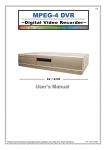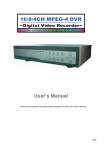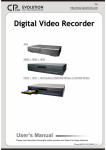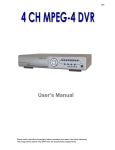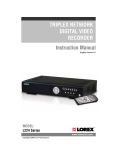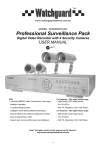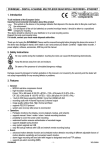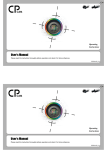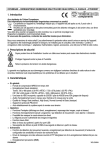Download Digital Video Recorder
Transcript
http://www.cpcamcctv.com Digital Video Recorder User’s Manual Please read instructions thoroughly before operation and retain it for future reference. ① CPD507, 505_V0.985 Thank-You Note Before You Get Start First of all, we would like to express our gratitude to you for purchasing this product. This product is designed to meet your personal needs with our great industry-designing ability and our everlasting perseverance to the quality of all our products. This manual will introduce to you how to install this apparatus. Please keep it well for your future reference. Now, we would like to invite you to personally experience all of the powerful functions this product offers. Note: Version: 1030-08-H3-04-V354-07 ; 0023 Note: Any changes of AP, please refer to your distributor. Note: Any changes of this manual made to the actual product are subjects to no further notification. IMPORTANT SAFEGUARD CAUTION RISK OF ELECTRIC SHOCK CAUTION: To reduce the risk of electric shock, do not expose this apparatus to rain or moisture. Only operate this apparatus from the type of power source indicated on the label. Failure to do so may cause injury or death by electric shock and invalidates the warranty. The lightning flash with arrowhead symbol, within an equilateral triangle, is intended to alert the user to the presence of uninsulated “dangerous voltage” within the product’s enclosure that may be of sufficient magnitude to constitute a risk of electric shock to persons. This exclamation point within an equilateral triangle is intended to alert the user to the presence of important operating and maintenance (servicing) instructions in the literature accompanying the appliance. CE Mark This apparatus is manufactured to comply with the radio interference requirements of EN 55022 : 1998 + A1 : 200, EN61000-3-2 : 2000, EN6100-3-3:1995, EN50130-4 : 1995 + A1 : 1998. TABLE OF CONTENTS PARTS AND FEATURES 1.1 1.2 1.3 1.4 1.5 FEATURES --------------------------------------------------------------------------------------------------------PACKAGE CONTENTS ----------------------------------------------------------------------------------------SPECIFICATION -------------------------------------------------------------------------------------------------FRONT PANEL ---------------------------------------------------------------------------------------------------REAR PANEL ------------------------------------------------------------------------------------------------------ INSTALLATION AND CONNECTION 2.1 PHYSICAL CONNECTION -------------------------------------------------------------------------------------2.2 GETTING STARTED ---------------------------------------------------------------------------------------------- 1 1 2 4 6 8 9 ADVANCED FUNCTIONS 3.1 MOTION DETECTION SETTING ----------------------------------------------------------------------------- 10 3.2 NETWORK BACKUP -------------------------------------------------------------------------------------------- 11 BASIC OPERATION 4.1 RECORDING ------------------------------------------------------------------------------------------------------4.2 PLAYBACK --------------------------------------------------------------------------------------------------------- DETAILED MENU CONFIGURATION 5.1 5.2 5.3 5.4 5.5 5.6 5.7 5.8 5.9 5.10 5.11 5.12 5.13 5.14 5.15 5.16 MENU TREE -----------------------------------------------------------------------------------------------------ACCESS MENU -------------------------------------------------------------------------------------------------MAIN MENU OPTIONS_ RECORD ------------------------------------------------------------------------MAIN MENU OPTIONS_ TIMER ----------------------------------------------------------------------------MAIN MENU OPTIONS_ DATE -----------------------------------------------------------------------------MAIN MENU OPTIONS_ ADVANCE -----------------------------------------------------------------------ADVANCE MENU_ CAMERA -------------------------------------------------------------------------------ADVANCE MENU_ DETECTION ---------------------------------------------------------------------------ADVANCE MENU_ DISPLAY -------------------------------------------------------------------------------ADVANCE MENU_ ALERT ----------------------------------------------------------------------------------ADVANCE MENU_ REMOTE --------------------------------------------------------------------------------ADVANCE MENU_ SYSTEM --------------------------------------------------------------------------------ADVANCE MENU_ NETWORK -----------------------------------------------------------------------------ADVANCE MENU_ BACKUP --------------------------------------------------------------------------------ADVANCE MENU_ HDD INFO ------------------------------------------------------------------------------ADVANCE MENU_ EVENT LOG ---------------------------------------------------------------------------- ADDITIONAL OPERATION 6.1 6.2 6.3 6.4 6.5 6.6 6.7 6.8 6.9 6.10 SEARCH ----------------------------------------------------------------------------------------------------------2X DIGITAL ZOOM ---------------------------------------------------------------------------------------------KEY LOCK --------------------------------------------------------------------------------------------------------SWITCH THE N/P SYSTEM ----------------------------------------------------------------------------------USB UPGRADE--------------------------------------------------------------------------------------------------LICENSED SOFTWARE AP----------------------------------------------------------------------------------CONNECT TO AP VIA IE BROWSER ---------------------------------------------------------------------RETR ---------------------------------------------------------------------------------------------------------------GPRS ---------------------------------------------------------------------------------------------------------------OPTIONAL PHERIPHERALS -------------------------------------------------------------------------------- 11 12 13 14 15 16 17 18 18 19 21 22 23 24 25 26 27 27 28 29 29 29 30 30 45 47 47 47 TROUBLE SHOOTING 7.1 FAQ ------------------------------------------------------------------------------------------------------------------7.2 CPCAM GLOBAL SERVICE ----------------------------------------------------------------------------------- APPENDIX #1 APPENDIX #2 APPENDIX #3 APPENDIX #4 APPENDIX #5 48 49 INSTALL THE HDD ---------------------------------------------------------------------- 50 PIN CONFIGURATION ----------------------------------------------------------------- 51 RECORDING TIME TABLE ------------------------------------------------------------ 52 COMPATIBLE USB BRAND ----------------------------------------------------------- 53 COMPATIBLE HDD BRAND ----------------------------------------------------------- 54 PARTS AND FEATURES 1.1 FEATURES General: MPEG-4 real time compression format High resolution recording (For 16 channels): Frame: 720 × 480 pixels with 120 IPS〈NTSC〉/ 720 × 576 pixels with 100 IPS 〈PAL〉 CIF: 352 × 240 pixels with 480 IPS〈NTSC〉/ 352 × 288 pixels with 400 IPS 〈PAL〉 2 HDD bases built-in, each can support more than 400GB Record audio with 4ch in and 2ch out Image quality setting: Best, High, Normal and Basic Support PELCO-D protocol System auto recovery after power reconnected Web function supports MJPEG compression format for transmitting over the internet Support TCP/IP, PPPoE, DHCP and DDNS network connection Operation: Pentaplex functions (live display, record, playback, backup, and network) Support manual / timer / motion / alarm / remote recording functions Support covert screen for live view channels Watermark function ensures authentication of recorded images Support Hot Point function Support daylight saving function Easy system upgrade via USB Easy file backup methods with USB, DVD R/W (optional), CD R/W (optional) and network remote backup IR remote control of the system and PTZ through RS-485 Events: Remote Event Trigger Recording Advanced motion detection function (4 different adjustable factors of motion detection sensitivity) and convenient search function. Alarm trigger recording will send alert with images to designated e-mail and FTP address Supports pre-alarm recording (8MB). Network Viewing: Remote surveillance on mobile phone via 3G & GPRS or on PC through internet connection Web surveillance supports multiple viewers simultaneously (up to 5 users) External Device: Extensive recording time by connected to Independent Disk Array. Optional: Independent disk array; VGA connector; GPRS connector. 1.2 PACKAGE CONTENTS Digital Video Recorder Adapter Licensed Software AP *8 Accessories Packs IR Transmitter and IR Receiver (1.5m) Manual & Quick Start NOTE: Please check the package contents to make sure that you receive all accessories shown above. 1 1.3 SPECIFICATION Video System NTSC / PAL (switch able) Video Compression Format MPEG 4 Video Input 16 / 8 Channels. Composite video signal 1 Vp-p 75Ω BNC Video Loop Out 16 / 8 Channels. Composite video signal 1 Vp-p 75Ω BNC Video Output Main Monitor Output: Composite video signal 1 Vp-p 75Ω BNC Call Monitor Output: Composite video signal 1 Vp-p 75Ω BNC Maximum Recording Rate 16 channels ~ Frame: 720 × 480 pixels with 120 IPS〈NTSC〉/ 720 × 576 pixels with 100 IPS 〈PAL〉 CIF: 352 × 240 pixels with 480 IPS〈NTSC〉/ 352 × 288 pixels with 400 IPS 〈PAL〉 8 channels ~ Frame: 720 × 480 pixels with 60 IPS〈NTSC〉/ 720 × 576 pixels with 50 IPS 〈PAL〉 CIF: 352 × 240 pixels with 240 IPS〈NTSC〉/ 352 × 288 pixels with 200 IPS 〈PAL〉 Adjustable Recording Speed 16 channels ~ Frame: 120, 60, 30, 15 IPS <NTSC> / 100, 50, 25, 12 IPS <PAL> CIF: 480, 240, 120, 60 IPS <NTSC> / 400, 200, 100, 50 IPS <PAL> 8 channels ~ Frame: 60, 30, 15, 7 IPS <NTSC> / 50, 25, 12, 6 IPS <PAL> CIF: 240, 120, 60, 30 IPS <NTSC> / 200, 100, 50, 25 IPS <PAL> Image Quality Setting Best, High, Normal, and Basic Hard Disk Storage IDE type, ATA66, supported HDD * 2, support each HDD capacity over 400GB HDD Quick Cleaning Quick clean up the “index system” of the recorded files. 250GB under 2 seconds Recording Mode Manual/Timer/Motion/Alarm / Remote Watermark Yes Refresh Rate 16 channels: 480 IPS for NTSC / 400 IPS for PAL Pentaplex Operation Pentaplex functions (live display, record, playback, backup, and network) Audio I/O 4 audio inputs, 2 audio outputs (Mono) Motion Detection Area 16 × 12 grids per camera for all channels Motion Detect Sensitivity 4 adjustable variable with precise calculation for motion detection Pre-alarm Recording Yes (8 MB) Backup Device USB1.1 backup and network remote backup 2 8 channels: 240 IPS for NTSC / 200 IPS for PAL Specification Continued… USB Interface Support 2 USB 1.1 ports (front panel * 1, back panel * 1) R.E.T.R. Support Remote Event Trigger Recording Web Transmitting Compression Format Motion JPEG Ethernet 10/100 Base-T. Support remote control and live view via Ethernet. Mobile Surveillance Support 3G & GPRS to access the system via mobile phone (require J2ME, MIDP2.0 protocol) Web Interface Support licensed software AP, and IE browser Remote Alarm Notification E-mail images, and images uploading to FTP site’s specific account Network Protocol TCP/IP, PPPoE, DHCP and DDNS Remote Control Remote control DVR and PTZ via IR transmitter (RS-485) PTZ control Support PELCO-D protocol Hot Point Control Yes Dwell Time (Sequential Channel Switch) Programmable with adjustable dwell time Alarm I/O 16 channels: 16 inputs, 1 output Picture Zoom Support 2X digital zoom function Key Lock Yes Video Loss Detection Yes Camera Title Support up to 6 letters Video Adjustable Hue/Color/Contrast/ Brightness Date Display Format YY/MM/DD, DD/MM/YY, MM/DD/YY, and Off Daylight Saving Yes Power Source DC 19V Current Consumption <64 W Operating Temperature 10℃ ~ 40℃ (50℉~104℉)) Dimensions (mm) 432mm (W) × 90mm (H) × 326mm (D) System Recovery System auto recovery after power reconnected Optional Peripherals Independent disk array; VGA connector; GPRS connector (Coming Soon) Design and specification are subject to change without notice. 3 8 channels: 8 inputs, 1 output 1.4 FRONT PANEL [ 507, 505 ] a b c d e f g h i j k 1) POWER: (a) Press “POWER” button to turn on/ turn off the DVR. (Under recording mode, please stop record before turn off the DVR) 2) MENU: (b) Press “MENU” button to enter main menu. 3) ENTER / RECORD : (c) Press “ENTER” button to confirm. / Press “ l m n ” to activate the manual recording. 4) “+ CH - ”: (d) Press “+ CH - ” button to change the setting in the menu / to select the channel. 5) USB: (e) Support firmware update and files backup. 6) LED LIGHT: (f) POWER: Power on STANDBY: Standby HDD: HDD is reading or recording HDD Full: HDD is full. ALARM: Once the alarm is triggered TIMER: When timer recording is turned on. REC: Under recording status PLAY: Under playing status 7) MODE : (h) Press “ ” button to switch channel display mode (16, 9, 4 channels display mode, and show the switch display by each channel) 4 8) “ ”: (i) Press “ ” button to pause the play back files. 9) “ ”: (j) Press “ ” button to stop the play back files. 10) “ “: (k) Under playback mode, press “ ” button to fast rewind. 11) “ “: (l) Under playback mode, press “ ” to fast forward. 12) “ZOOM”: (m) Press “ZOOM” button to enlarge the picture of selected channel (2X digital zoom). 13) “PLAY” : (n) Press “PLAY” button to playback recorded files. 14) “▲▼◄►“: (i), (j), (k), (l) Press “▲▼◄►” to move the cursor up / down / left / right. 15) “ ”+“ ” : (g +h) Press “ ”+“ ”to activate the call monitor function and press “ to escape the call monitor mode. 16) “ ”+“ Press “ channels. ”+“ “ : (g+i) “ to select live or playback sounds of the 4 audio 17) “ ”+“ “ : (g+j) Under playback mode, press “ 18) “ ”+“ Press “ channel. 19) “ ”+“ ”+“ ” “ or “ ”+“ “ to show slow playback. ”: (g+k) or (g+l) “ or “ ” change the setting in the menu / to select the ” : (g+m) Press “ ”+“ ” to change channel display position. Press “▲▼◄►” to select the channel which You would like to change, Press “+” or “-” select the channel which You would like to show. Press “ENTER” button to confirm. 20) “ Press “ ”+“ 21) “ ”+“ Press “ ”+“ ”: (g+n) ” button to enter the search mode. ”: (k+l) ”+“ ” buttons at the same time to enter / exit the PTZ control mode. 22) R.E.T.R.: (b+d) Press “MENU” + “-” button to activated R.E.T.R. function 3 / 5 / 10 minutes later. Please refer to “Section 5.12” 5 1.5 REAR PANEL 14 [ 507 ] 15 16 9 10 17 13 12 1 2 3 4 5 6 7 8 11 [ 505 ] 13 15 12 16 17 14 1 2 3 4 5 6 7 8 9 10 11 1) DISK ARRAY PORT: Connect to disk array for extend HDD capacity. 2) IR: Connect to IR receiver. 3) RS485: Connect to external device (such as PTZ camera) with RS485-A and RS485-B. 4) EXTERNAL I/O PORT: Connect to external device. Control external device or controlled remotely by external device (alarm input, external alarm, PTZ camera). 6 5) USB PORT: Support firmware update and files backup. 6) D/V PORT (Digital Video Port): Connect to VGA connector card. 7) LAN: Connect to Internet by LAN cable. 8) LINK / ACT LED light: When the Internet is activated, the LED light will turn on. 9) CALL MONITOR: Connect to CALL monitor. Show the channel switch display. When the alarm is triggered, the call monitor will show the image of the triggered channel for a period of time. 10) POWER: Connect to provided adapter. 11) FAN: For ventilation. 12) VIDEO INPUT (CHANNEL 1 - 16 / CHANNEL 1 - 8) : Connect to video source, such as camera. 13) LOOP (CHANNEL 1 - 16 / CHANNEL 1 - 8): Video output. 14) 75Ω / HI: When using Loop function, please switch to HI. When you don’t use Loop function, please switch to 75Ω. 15) MONITOR: Connect to Main monitor. 16) AUDIO IN (1-4): Connect to audio source, such as camera which equipped with audio function. When users start the recording function, the audio input will be recorded . 17) AUDIO OUT : Connect to monitor or speaker. With 2 mono audio outputs from the same source. 7 INSTALLATION AND CONNECTION 2.1 PHYSICAL CONNECTION Connecting all the devices to construct a surveillance system, as shown below. 1) Install HDDs: The HDDs must be installed before the DVR is turned on. 2) Connect cameras. 3) Connect monitors. 4) Connect the external devices. 5) Connect power. NOTE: Please refer to Appendix #1 for HDD installation instructions. NOTE: Please refer to Appendix#2 for pin configurations of the external I/O port . [ 507 ] [ 505 ] 8 2.2 GETTING STARTED 1) Before using the DVR, please have the HDDs installed ready. (refer to Appendix #1 for installation of HDDs). 2) Connect the AC power cord to power adapter and plug into an electrical outlet. The standby LED light will turn to red. Press the “POWER” button. The power LED will be red. It takes approximately 10 to 15 seconds to boot the system with the message : “ SYSTEM INIT... ”, “DETECTING MASTER HDD”, “DETECTING SLAVE HDD”, “DETECTING DISKARRAY”, “AUDIO M” and also version information, etc. 3) Before operating the DVR, please set up the system time first. (for setting system time, please refer to “DATE” settings). SYSTEM INIT… DETECTING MASTER HDD DETECTING SLAVE HDD DETECTING DISKARRAY AUDIO M OK FAIL FAIL OK VERSION 1030-08-H3-04-V354-07 SYSTEM NTSC - 507 - System Time Available Capacity of Internal HDDs Under HDD Overwrite Mode Channel Title NOTE : When “HDD not found” message shows up, please refer to appendix # 1. It may result from the improper installation of the HDD. 9 ADVANCED FUNCTIONS “Advanced Motion Detection Setting” allows users to adjust different sensitivity factors base on different environment. And “Network Backup” allows users to use licensed software AP to backup the recorded files to PC, and playback the backup files. 3.1 MOTION DETECTION SETTING 1) LS : The sensitivity of comparing two different images. The smaller the value is, the more sensitive the detection will become. Application ~ * Environment vibration * Light shift * Shadow * Mirror reflection 2) SS : The sensitivity towards the size of the triggered object on the screen. The smaller the value is, the more sensitive the detection will become. Application ~ * Different size of the object on the screen. 3) TS : The sensitivity towards how long the object gets triggered. The smaller the value is, the more sensitive the detection will become. Application ~ * Different speed of the moving object 4) RE : The value of RE is a reference for detection. The default value is 10, which means DVR will compare 10 continuous images at one time according to the sensitivity of LS, SS, TS simultaneously. Therefore the bigger the value is, the more sensitivity the detection will become. Application ~ * Slow and regular environment change Scenario : Warehouse Different environments may require different settings, the sample below is for your reference. LS SS TS RE Entrance 10 2 2 10 Back door 8 1 2 10 Sidewalk 5 2 2 10 Window 12 2 10 10 Note 1 : The real appropriate setting value will depend on the real situation (such as the angle of the lens, the distance between the camera and object…etc.) Note 2 : User could also refer to “Section 5.8 Advance Menu_Detection” for detail setting. 10 3.2 NETWORK BACKUP Users could easily use the licensed software AP to backup the recorded files to PC. And then playback the backup videos. For detail operation, please refer to “Section 6.6 LICENSED SOFTWARE AP” network backup item. BASIC OPERATION 4.1 RECORDING The DVR offers three recording modes, manual record, event recording, and timer record. If power is off accidentally, recorded video files will still be stored in the HDDs. DVR will return to original recording status after power is on again. 1) MANUAL RECORDING (continuous recording) : Recording is initiated by manually pressing the “REC” button. Indicated by the sign “●” 2) EVENT RECORDING (triggered by motion and external alarm) : When this functions is activated, the recording is triggered by motion or external alarm. Indicated by the sign “ ” and “ ”. 3) TIMER RECORDING (scheduled time) : Recording is scheduled by Timer. Indicated by the sign “TIMER RECORD”. Under Recording NOTE : When the HDDs are full under O/W recording mode, previous recorded files may be overwritten without further warning notices. 11 4.2 PLAYBACK Press “ PLAY ” button, the DVR will display the last recording video. 1) FAST FORWARD (F.F. ) & FAST REWIND (REW): You can increase speed for fast forward and rewind on the DVR. In the playback mode, * Press ” ” once to get 4X speed forward and press twice to get 8X speed,… and the maximum speed can reach 32X. * Press ” ” once to get 4X speed rewind and press twice to get 8X speed, … and the maximum speed can reach 32X. * The type of recording image size (Frame or CIF )will also shown on the screen. 2) PAUSE / IMAGE JOG: Press “ ” button to pause the current image displayed on the screen. In the Pause mode, * Press ” ” once to get forward by frame change. * Press ” ” once to get rewind by frame change. 3) STOP: Press “ 4) ” button under all circumstance, it will return DVR to live monitoring mode. CHANNEL SHIFT: * Display mode: Press MODE “ ” button to select display mode (16 / 9 / 4 channels). * Full Screen Switch: Press “+” or “-” button to show the full screen channels. * Channel display switch: Press “ ”+“ ” button. Press “▲” “▼” “◄” “►” to select the channel which You would like to change. Press “+” or “-” select the channel which You would like show. Press “ENTER” button to confirm. 5) SLOW PLAYBACK: Press “ ”+“ ” button to get 1/4X speed playback and press twice to get 1/8X speed, three times to get 1/16X speed, and four times to get 1/32X speed. 6) AUDIO: Press “ ”+“ “ to select live or playback sounds of the 4 audio channels. * AUDIO 1 (L) ; AUDIO 1 (P) * AUDIO 2 (L) ; AUDIO 2 (P) * AUDIO 3 (L) ; AUDIO 3 (P) * AUDIO 4 (L) ; AUDIO 4 (P) 12 DETAILED MENU CONFIGURATION 5.1 MENU TREE MENU TITLE RECORD TIMER ADVANCE DATE BRIG CAMERA MANUAL RECORD ENABLE EVENT RECORD ENABLE TIMER RECORD ENABLE DATE: YEAR MONTH DAY DATE SATU HUE START HH : MM TIME: HOUR MIN SEC COV END HH : MM FORMAT: YY-M-D … REC DETECTION DAYLIGHT SAVING TITLE DET OVERWRITE RECORD IMG SIZE CONT AREA DISPLAY LS ALERT RECORD QUALITY MANUAL RECORD IPS EVENT RECORD IPS EXT. ALERT DATE DISPLAY INT. BUZZER HDD INFO KEY BUZZER LOSS SCREEN TIMER RECORD IPS TOTAL IPS SHARE SS TITLE DISPLAY PLAYBACK INFO DWELL DURATION (SEC) DEDEINTERLACE WATERMARK REMOTE TS RE ALARM VLOSS BUZZER MOTION BUZZER ALARM BUZZER SYSTEM TITLE SERIAL TYPE DEVICE HDD BUZZER BAUD RATE ID HDD NEARLY FULL (GB) HOST ID PROTOCOL IR RATE ALARM DURATION (SEC) PASSWORD PREPRE-ALARM NETWORK RESET DEFAULT CLEAR HDD UPGRADE BACKUP HDD INFO EVENT LOG R.E.T.R. (MIN) AUTO KEYLOCK LANGUAGE VERSION 13 VIDEO FORMAT 5.2 ACCESS MENU Press “MENU” button to enter the main menu list. The default password is 0000. Enter the default password and press “ENTER”. (Users could alter the password later, please refer to “Section 5.12 ADVANCE MENU_SYSTEM”) Tip: Tip The default password is “0000”, users could just press “ENTER” four times instead of using “+” , “-” to select “0” “0” “0” “0”. (MENU) RECORD TIMER DATE ADVANCE There are 4 options available in the main menu: RECORD -------- Record mode setup. TIMER ----------- Timer recording setup. DATE ------------- System date setup. ADVANCE ------- Advance functions setup. Use the following buttons for menu setting: “▲▼◄► “ to move the cursor. “+ , -” to choose the numbers / selections. “ ENTER “ to go to the submenu / to confirm the selection “ MENU “ to go to the menu OSD / to confirm the change / to exit the menu OSD 14 5.3 MAIN MENU OPTIONS___RECORD (MENU) ► RECORD TIMER DATE ADVANCE Move the cursor to the “RECORD”, and press ”ENTER”, then the screen will show the following options. RECORD MANUAL RECORD ENABLE EVENT RECORD ENABLE TIMER RECORD ENABLE OVERWRITE RECORD IMG SIZE RECORD QUALITY MANUAL RECORD IPS EVENT RECORD IPS TIMER RECORD IPS TOTAL IPS SHARE 1) MANUAL RECORD ENABLE: Start / Stop the manual recording function. 2) EVENT RECORD ENABLE: Start / Stop the event recording function. When this functions is activated, the recording will triggered by motion or external alarm 3) TIMER RECORD ENABLE: Start / Stop the timer recording function. 4) OVERWRITE: Select to overwrite previous recording video in HDD. When the HDD is full under O/W recording mode, previous recorded files will be overwritten without further warning notices. 5) RECORD IMG SIZE: There are three recording options: FRAME & CIF. When change record image size, user need to stop recording first. 6) RECORD QUALITY: There are four quality settings: BEST, HIGH, NORMAL & BASIC In the following (7) ~ (10) sections is for 16 channels. For 8 channels, divided the IPS by 2. 7) MANUAL RECORD IPS: Recording is activated by pressing the “REC” button. Select the images per second of MANUAL RECORD, The options are as the followings: NTSC: PAL: NTSC FRAME: 120, 60, 30, 15 PAL FRAME: 100, 50, 25, 12 CIF: 480, 240, 120, 60 CIF: 400, 200, 100, 50 15 8) EVENT RECORD IPS: Recording is activated by event (alarm and motion trigger). Select the images per second for event record, The options are as the followings: NTSC: PAL: NTSC FRAME: 120, 60, 30, 15 PAL FRAME: 100, 50, 25, 12 CIF: 480, 240, 120, 60 CIF: 400, 200, 100, 50 9) TIMER RECORD IPS: Recording is activated by timer schedule. Select the images per second of TIMER RECORD, The options are as the followings: NTSC: PAL: NTSC FRAME: 120, 60, 30, 15 PAL FRAME: 100, 50, 25, 12 CIF: 480, 240, 120, 60 CIF: 400, 200, 100, 50 10) TOTAL IPS SHARE: There are two IPS settings: FIX: FIX IPS per channel = RECORD IPS ÷ 16 channels GROUP: GROUP Every 4 channels will form a group. IPS per channel = RECORD IPS ÷ 4 ÷ number of channels under recording within the group. Ex.: If you set the record IPS as 480 IPS, then Channel 01 will get 30 IPS (120 / 4 / 1 = 30) Channel 05 and 06 each will get 15 IPS (120 / 4 / 2 = 15) “ ● “ means under recording Group 1 : CH 01 ~ 04 ● 01 ● ● 05 06 Group 2 : CH 05 ~ 08 Group 3 : CH 09 ~ 12 Group 4 : CH 13 ~ 16 NOTE: When users choose the image size as “CIF”, the total IPS share will be fixed. That is IPS per channel will equal to record IPS divided by 16 channels. 5.4 MAIN MENU OPTIONS___TIMER (MENU) RECORD ► TIMER DATE ADVANCE Move the cursor to the “TIMER”, and press ”ENTER”, then the screen will show the following options. TIMER DATE HH : MM OFF 00 : 00 DAILY 08 : 00 SUN 06 : 00 MON-FRI 00 : 00 OFF 00 : 00 OFF 00 : 00 OFF 00 : 00 16 HH : MM 00 : 00 18 : 00 23 : 00 00 : 00 00 : 00 00 : 00 00 : 00 1) DATE: A scheduled record date (SUN/MON/TUE/ WED/ THU/ FRI/ SAT/ MON–FRI / SAT-SUN / DAILY/OFF) could be set to activate the timer recording. NOTE 1 : Specific date could be changed by “+” or “-” button. NOTE 2 : If you plan to set the timer recording across the midnight, there are two ways for setting the timer recording schedule, please following the instructions below. Example 1 : If you only want to set recording timer schedule from every Sunday 23:30 to Monday 23:30, then you could set recording timer schedule as Sunday from 23:30 to 23:30. Example 2 : If you plan to set the timer recording from Sunday 08:00 to Monday 15:00, then you could set the recording timer schedule as Sunday from 08 : 00 to 00 : 00, and Monday 00 : 00 to 15 : 00. 2) START HH / MM: Select the start time for the recording. 3) END HH / MM: Select the finishing time for the recording. 5.5 MAIN MENU OPTIONS___DATE (MENU) RECORD TIMER ► DATE ADVANCE Move the cursor to the “DATE”, and press ”ENTER”, then the screen will show the following options. DATE DATE FORMAT DAYLIGHT SAVING 2005-NOV-08 13:55:22 Y-M-D ON 1) DATE: Set the correct time of the DVR ( YEAR / MONTH / DAY / HOUR / MIN / SEC) 2) FORMAT: There are three date formats: Y-M-D, M-D-Y, D-M-Y. 3) DAYLIGHT SAVING: Specify whether to use daylight saving time and time period. ( ON / OFF) Daylight saving time can be adjusted manually. Enter the daylight saving menu mode to set start time, end time and adjust hour of the daylight saving. DAYLIGHT SAVING ON OFF ADJUST 4TH-SUN-MAR 01: 00: 00 4TH-SUN-MAR 01: 00: 00 01 : 00 NOTE: Press “+” or “-” button to do the selections. 17 5.6 MAIN MENU OPTIONS___ADVANCE (MENU) RECORD TIMER DATE ►ADVANCE Move the cursor to the “ADVANCE”, and press ”ENTER”, then the screen will show the following options. ADVANCE CAMERA DETECTION DISPLAY ALERT REMOTE SYSTEM NETWORK BACKUP HDD INFO EVENT LOG 5.7 ADVANCE MENU ___CAMERA Move the cursor to the “CAMERA”, and press ”ENTER”, then the screen will show the following options. TITLE 01 02 03 04 05 06 07 08 PRE BRIG 110 110 110 110 110 110 110 110 NEXT CONT 128 128 128 128 128 128 128 128 CAMERA SATU 128 128 128 128 128 128 128 128 18 HUE 128 128 128 128 128 128 128 128 COV NO NO NO NO NO NO NO NO REC YES YES YES YES YES YES YES YES 1) TITLE: Move the cursor to the title which you want to change, and press “ENTER” to access the setting screen. Assign each channel a title (up to six characters (letters or symbols…)), the default title is the channel number. 2) BRIG / CONT / SATU / HUE: Adjust the Brightness/Contrast/Saturation/Hue of each channel. The level is from 0 to 255. The default value of BRIG is 110, others are128. 3) COV (COVERT): Select “YES” to mask the selected channel which is under recording. When this function is activated, the “COV” words will shown on the screen. 4) REC (RECORD): Select “YES” to enable the record function; Select “NO” to disable the record function. 5) PRE / NEXT: Select “PRE” to go to the previous page; Select “NEXT” to go the next page. NOTE: TITLE : 6 characters (letters or symbols…). BRIG : from 0 ~ 255, the default value is 110. CONT : from 0 ~ 255, the default value is 128. SATU : from 0 ~ 255, the default value is 128. HUE : from 0 ~ 255, the default value is 128. CONV : YES or NO. REC : YES or NO. 5.8 ADVANCE MENU ___DETECTION Move the cursor to the “DETECTION”, and press ”ENTER”, then the screen will show the following options. TITLE 01 02 03 04 05 06 07 08 PRE DET ON ON ON ON ON ON ON ON NEXT AREA SETUP SETUP SETUP SETUP SETUP SETUP SETUP SETUP LS 07 07 07 07 07 07 07 07 DETECTION SS 03 03 03 03 03 03 03 03 19 TS 02 02 02 02 02 02 02 02 RE 10 10 10 10 10 10 10 10 ALARM OFF LOW HIGH OFF OFF OFF OFF OFF 1) TITLE: Show the title of each channel of the camera. 2) DET: Select “ON” to activate the motion detect function of each channel. Select “OFF” to inactivate the motion detect function of each channel. 3) AREA: Press the “ENTER” button to set detection area. Pink blocks represent the area that is not being detected. While the transparent blocks is the area that is under detection. Press “ENTER” to confirm the start area Press ◄ or ► to choose the width of the area Multi-detected area Press “-” to turn all area under detection Press ◄ or ► to choose the height of the area, and press “ENTER” again to confirm. Press “+” to turn all area not to be detected ▲▼◄►: navigates between targets. 4) LS : The sensitivity of comparing two different images. The smaller the value is, the higher sensitivity for motion detection. The highest sensitivity setting is 00, the lowest sensitivity setting is 15. The default value is 07. 5) SS : The sensitivity towards the size of the triggered object on the screen.(the number of motion detection grids). The smaller the value is, the higher sensitivity for motion detection. The highest sensitivity setting is 00, and the lowest sensitivity setting is 15. The default setting is 03. Note: The default setting of Spatial Sensitivity is 03, which means when 3 grids are detected for motion at one time, the system will get triggered. So the value of Spatial Sensitivity must be less than the number of grids which you set up to motion detection area. 20 6) TS : The sensitivity towards how long the object gets triggered. The smaller the value is, the higher sensitivity for motion detection. The highest sensitivity setting is 00, and the lowest sensitivity setting is 15. The default setting is 02. 7) RE : The value of RE is a reference for detection. The default value is 10, which means DVR will compare 10 continuous images at one time according to the sensitivity of LS, SS, TS simultaneously. Therefore the bigger the value is, the higher sensitivity for motion detection. 8) ALARM: Select LOW / HIGH for the alarm polarity. The default alarm value is OFF. 9) PRE / NEXT: Select “PRE” to go to the previous page; Select “NEXT” to go the next page. Targets set in the AREA. 5.9 ADVANCE MENU ___DISPLAY Move the cursor to the “DISPLAY”, and press ”ENTER”, then the screen will show the following options. DISPLAY TITLE DISPLAY DATE DISPLAY HDD INFO LOSS SCREEN PLAYBACK INFO DWELL DURATION (SEC) DE-INTERLACE WATERMARK ON ON ON BLUE NORMAL 2 ON ON 1) TITLE DISPLAY: Turn the channel title display on / off. 2) DATE DISPLAY: Turn the date display on / off. 3) HDD INFO” Turn the display information of internal HDD on / off. 4) LOSS SCREEN” Set the color of video loss screen (Blue or Black) 5) PLAYBACK INFO: Set the position where playback information will be indicated (center or normal (on the button of left-hand side of the screen)). 6) DWELL DURATION (SEC): Set the duration time of each channel for CALL MONITOR (2, 4, 8, 16 sec.) 21 7) DE-INTERLACE: Set the “DE-INTERLACE” function on / off. 8) WATERMARK: Select watermark function on / off. If users activate the watermark function, then when playback the backup file in the software AP, users could proof the authenticity of the recorded video. Please refer to P. 35 for detailed instruction. 5.10 ADVANCE MENU ___ALERT Move the cursor to the “ALERT”, and press ”ENTER”, then the screen will show the following options. ALERT EXT. ALERT INT. BUZZER KEY BUZZER VLOSS BUZZER MOTION BUZZER ALARM BUZZER HDD BUZZER HDD NEARLY FULL (GB) ALARM DURATION (SEC) PRE-ALARM ON ON ON ON ON ON ON 05 05 OFF 1) EXT. ALERT: Set the sound on / off when external alarm is triggered. 2) INT. BUZZER: Set the sound of KEY / VLOSS / MOTION / ALARM / HDD FULL on or off. 3) KEY BUZZER: Set the sound on / off when pressing the button. 4) VLOSS BUZZER: Set the sound on / off when video loss happened. 5) MOTION BUZZER: Set the sound on / off when motion alarm triggered. 6) ALARM BUZZER: Set the sound on / off when internal alarm triggered. 7) HDD BUZZER: Set the sound on / off when the HDD is full. 8) HDD NEARLYFULL (GB): If HDD buzzer is on, you could choose to have a buzzer notification when the HDD available capacity is only xxx GB left. 22 9) ALARM DURATION (SEC): Press “ENTER” or “+” or “-” button to set the duration time of alarm recording (5, 10, 20, 40 sec.). 10) PRE-ALARM: Set the pre-alarm function on (8MB) / off. When pre-alarm and event record functions are activated, the DVR will record 8MB file before alarm / motion triggered. 5.11 ADVANCE MENU ___REMOTE Move the cursor to “REMOTE”, and press ”ENTER”, then the screen will show the following options. TITLE 01 02 03 04 05 06 07 08 PRE DEVICE PTZ CAMERA CAMERA CAMERA CAMERA CAMERA CAMERA CAMERA NEXT ID 001 002 003 004 005 006 007 008 REMOTE PROTOCOL P-D NORMAL NORMAL NORMAL NORMAL NORMAL NORMAL NORMAL RATE 02400 02400 02400 02400 02400 02400 02400 02400 1) TITLE: Title of each camera. 2) DEVICE: Select to control normal camera or PTZ camera for each channel. 3) ID: Set the ID number (0 ~ 255) as same as the ID of each device. 4) PROTOCOL: Select NORMAL (our protocol) or PELCO-D protocol. 5) RATE: Set the baud rate of each channel (2400, 4800, 9600, 19200, 57600). PTZ Control: 1) Device: Device Our own brand PTZ / Pelco-D protocol PTZ 2) Connection: Connection Refer to rear panel / Refer to PIN configuration 3) Control Mode: Mode Refer to front panel / Refer to IR remote control manual 4) Detailed Instructions: Instructions Refer to PTZ manual 23 5.12 ADVANCE MENU ___SYSTEM Move the cursor to the “SYSTEM”, and press ”ENTER”, then the screen will show the following options. SYSTEM SERIAL TYPE BAUD RATE HOST ID IR PASSWORD RESET DEFAULT CLEAR HDD UPGRADE R.E.T.R. (MIN) AUTO KEYLOCK LANGUAGE VERSION VIDEO FORMAT RS - 485 02400 003 ON 0000 RESET MASTER NO 3 NEVER ENGLISH 1030-08-H3-04-V354-07 NTSC 1) SERIAL TYPE: Press “ENTER” or “+” or “-” button to set the control serial type (RS-485, RS232) of DVR. 2) BAUD RATE: Press “ENTER” or “+” or “-” button to set the BAUD RATE of DVR (2400, 9600, 19200, 57600). 3) HOST ID: Press “ENTER” or “+” or “-” button to set the ID of DVR (0 ~ 255). 4) IR: Press “ENTER” or “+” or “-” button to set the IR function on / off. 5) PASSWORD: Press “ENTER” or “+” or “-” button to set the password for accessing DVR. 6) RESET DEFAULT: Press “ENTER”, and select “YES” to confirm or “NO” to chancel. 7) CLEAR HDD: Press “ENTER”, and “YES” to confirm clear HDD or “NO” to chancel. In this function, you can press “+” or “-” to select the HDD MASTER HDD, SLAVE HDD or DISK ARRAY which you plan to clear. 8) UPGRADE: Press “ENTER”, and select “YES” to confirm upgrade or “NO” to chancel. 9) R.E.T.R. (MIN): Set R.E.T.R. activated time (3, 5, 10 minutes after confirm the setting). * R.E.T.R. activate ~ Press “Menu” + “-” buttons on the front panel. When the R.E.T.R. is on, a message “R.E.T.R. ON” will be shown on the screen (in red text). * R.E.T.R. off ~ Press any key (except “SHIFT” and “POWER” buttons) and enter the password. 10) AUTO KEYLOCK: Set the auto key lock function (Never / 10 sec / 30 sec / 60 sec). 24 11) LANGUAGE: Press “ENTER”, and select the language of the OSD. 12) VERSION: The firmware version information will be shown on the screen. 13) VIDEO FORMAT: The information of the DVR’s video format will be shown on the screen. 5.13 ADVANCE MENU ___NETWORK Move the cursor to the “NETWORK”, and press ”ENTER”, then the screen will show the following options. NETWORK NETWORK TYPE DNS PORT 1) STATIC 168. 95. 0080 1. 1 NETWORK TYPE (STATIC): Select NETWORK TYPE, and press “+” or “-” button to set the network type as STATIC, and then press “ENTER” to go to the submenu of the network. In the submenu of network type, use “+” or “-” button to set all the information needed in the DVR. See the illustration below. STATIC IP GATEWAY NETMASK 2) 60. 121. 46. 236 60. 121. 46. 226 255. 255. 255. 254 NETWORK TYPE (DHCP): This DHCP function need to be supported by router or cable modem network with DHCP service. For detailed DHCP setting, please refer to P.36 and P.37 (Licensed Software AP). 3) NETWORK TYPE (PPPoE): This PPPoE function need to have “username” and “password” from ISP supplier. For detailed PPPoE setting, please refer to P.36 and P.37 (Licensed Software AP). NOTE: DHCP and PPPoE network types need to apply DDNS service to get “Hostname” to correspond to dynamic IP address. For detailed DDNS setting, please refer to P.37. 25 5.14 ADVANCE MENU ___ BACKUP Move the cursor to the “BACKUP”, and press ”ENTER”, then the screen will show the following options. BACKUP USB BACKUP Select “USB BACKUP” and then press “Enter”. USB BACKUP START TIME END TIME AVAILABLE SIZE CHANNEL HDD NUM BACKUP TO USB 2005-10-27 11 : 25 : 46 2005-10-27 11 : 50 : 58 0512 MB 01 MASTER START 1) START TIME: Select the start time of the backup. 2) END TIME: Select the end time of the backup. 3) AVAILABLE SIZE: The information of the USB available capacity. 4) CHANNEL: Choose the channel. 5) HDD NUM: Choose the HDD. 6) BACKUP TO USB: Press “ENTER” to start backup the chosen file to USB. NOTE: c The USB format must be “FAT 32”. d If the USB is not supported by the DVR, then the “USB ERROR” message will be shown on the screen. e It is suggest that clear all the files in the USB before you backup files in your USB. f DVD R/W or CD R/W are optional, please refer to their manual. g The file type of the backup files could only use the licensed software to view the playback. 26 5.15 ADVANCE MENU ___HDD INFO You can get all the capacity information of the connected HDD. HDD INFO HDD NUM MASTER EXT001 EXT003 EXT005 EXT007 EXT009 EXT011 HDD SIZE 400.517 400.517 400.517 NO HDD NO HDD NO HDD NO HDD HDD NUM SLAVE EXT 002 EXT 004 EXT 006 EXT 008 EXT 010 EXT 012 HDD SIZE NO HDD 400.517 NO HDD NO HDD NO HDD NO HDD NO HDD 5.16 ADVANCE MENU ___EVENT LOG You can get all the information (event type, time, and channel) of the event list (including video loss list, net list, other lists (such as power on / off, key unlock, reset to default). Select the event list you want to see and press “ENTER”. EVENT LOG VLOSS NET OTHERS CLEAR LIST LIST ALL 1) VLOSS LIST: Show the information of video loss list. 2) NET LIST: Show the information of net login list. 3) OTHERS: Show the information of power on / off, unlock, reset to default list. 4) CLEAR ALL: Clear all the event log lists. 27 6.1 SEARCH ADDITIONAL OPERATION Press “ ”+“ ” buttons on the front panel of the DVR to enter the search mode. Then the screen will show the following options. SEARCH HDD MASTER FULL LIST RECORD LIST SYSTEM LIST ALARM LIST MOTION LIST EVENT SEARCH TIME SEARCH 1) HDD: Select the the specific HDD. 2) FULL LIST: List all recorded files ( R: RECORD / S: SYSTEM / A: ALARM / MS: MOTION / T: TIMER). 3) RECORD LIST: List of manual recorded files. 4) SYSTEM LIST: List of system recorded files. Under continuous recording mode, the DVR system will save one recording file every one hour. 5) ALARM LIST: List of alarm trigger recorded files. 6) MOTION LIST: List of motion trigger recorded files. 7) EVENT SEARCH: Search by specific time period (YEAR / MONTH / DAY / HOUR / MIN / CHANNEL). Display all the motion triggered recording videos. When you saw the playback of the motion triggered recording videos, it would play with fast speed. 8) TIME SEARCH: Search by specific time period (YEAR / MONTH / DAY / HOUR / MIN). NOTE: Move the cursor to the specific recorded file and press “ENTER” to play the video, and press stop “ ” button to return the live display. 28 6.2 2X DIGITAL ZOOM Press “ZOOM” button on the front panel of the DVR to enlarge the picture of selected channel (2X digital zoom). You will have ¼ view size of the enlarged picture. Therefore use the “ ▲▼◄► “ to navigate. 20052005-MAYMAY-30 [MON] 14:50:37 DIGITAL ZOOM 400 GB 01 20052005-MAYMAY-30 [MON] 14:50:37 DIGITAL ZOOM 400 GB 01 1) Press the “ZOOM” button again to exit the zoom picture. 2) Press “ ▲▼◄► “ button to move the zoom position. 3) Users could also press the “Digital Zoom” button on the IR remote control panel. 6.3 KEY LOCK 1) Key Lock On: On c Press “MENU” + “ENTER” buttons to key lock. d Auto key lock: refer to “Section 5.12 ADVANCE MENU_SYSTEM”. 2) Key Lock Off: Off Press any key (except “SHIFT” and “POWER” buttons) and then key in the password to exit Key Lock mode. 3) Password: Password As to the password setting, please refer to “Section 5.12 ADVANCE MENU_SYSTEM”. 6.4 SWITCH THE N/P SYSTEM 1) Press “POWER” button to shutdown, and then press “POWER” + “►“ to switch to PAL system. 2) Press “POWER” button to shutdown, and then press “POWER” + “◄“ to switch to NTSC system. 29 6.5 USB UPGRADE Users can use USB for upgrade. Please format the USB memory device first. 1) Get the upgrade files from your distributor. 2) Save the upgrade files in your USB device (Do not change the file name). 3) Go to the “MAIN MENU – SYSTEM - UPGRADE” , and press “ENTER”. 4) Select “YES”, and press “ENTER” again to confirm upgrade. 1 WARNING 2 WARNING 3 WARNING UPGRADE ARE YOU SURE? PLEASE WAIT… UPGRADE KERNEL PLEASE WAIT… UPGRADE BOOT YES NO OK OK 4 5 WARNING WARNING 6 WARNING PLEASE WAIT… UPGRADE HTML UPGRADE SUCCESS REBOOT SHUTDOWN PLEASE WAIT… OK OK OK NOTE: c The USB format must be “FAT 32”. d If the USB is not supported by the DVR, then the “USB ERROR” message will be shown on the screen. 6.6 LICENSED SOFTWARE AP 1) Install the Software: Software c d e Put the attached CD into a CD-ROM and it will start to install application program into PC. The PC will auto run the setup file. After setup, user will see “ “ icon on the desktop. 30 2) Software Operation: Operation c Connect DVR with PC via RJ45 network line. d LAN Setting : The default DVR IP is “192.168.1.10”, and default “username” and “password” are both “admin”. Users should set PC IP address as “IP:192.168.1.XXX (1~255, except 10)” (in order to let the PC and DVR under the same domain). e Click twice to enter login page. Key in IP (192.168.1.10), username (admin), password (admin) into the login page. After connect to the DVR with local LAN, users could modify the network setting in DVR or in system config of the licensed software AP. f Network Type ~ Static IP : Set the network information in the DVR menu (Section 5.13) or in System Config of the licensed software AP (P.36). Network Type ~ Dynamic IP (DHCP and PPPoE) : Set the Network information in System Config of the licensed software AP. For detailed DHCP and PPPoE setting, please refer to P.36 and P.37. g After setup the network information, click twice to enter login page. Key in “Username”, “ Password”, and “IP” (Static IP) or “Host name” (Dynamic IP). And then click the green button to connect. h LOGIN AP Icon Explanation. Address Book: You can press this button to add a new IP into the IP Address Book or choose any preset IP address to access the Video Server. Search: Search available DVR IP address in local area network and modify the network setting of the DVR. Player: You can press this button to access and play the recorded files saved in your PC. Copy: You can press this button to copy all the software installation files, so you could keep all the settings of video web server for next software installation on other PC. NOTE: The version of the licensed software will shown on the login page. 31 Introduction of Basic Operation : Video Web Server Control Panel. i Digital Device Control Panel ~ 16CH DVR a c b e f g h i 60.121.46.236 j. k. l. m. n. o. p. q. r. s. a. Image Transfer Rate Per Second b. Data Transfer Rate c. Connect / Disconnect d. Resolution: NTSC: 320 × 228 PAL: 320 × 276 t. u. v. w. x. ; 640 × 456 ; 640 × 552 e. Image Quality (High, Medium, Low) f. Snapshot : press this button to have a snapshot of the image which will be saved in the designated destination. 32 g. h. i. j. k. l. m. n. o. p. q. r. s. t. u. Record : press this button, the video web server will start to record, and press this button again to stop record. The recording files will be saved to PC. Each recording file can up to 18,000 frames. When the recording file capacity is full, the new recorded file will be saved to the second file. Besides, if the HDD space is less than 200MB, the program will stop recording. System Config: press this button to enter the setting page of the video web server. Number of Online Users CH 1 ~ 16 4, 9, 16 Channel Display Search Record Stop / Fast Rewind / Fast Forward / Pause / Slow Playback / Play + - Digital Zoom Set : press this button to change channel display position. Press “▲▼◄►” to select the channel which You would like to change. Press “+” or “-” select the channel which You would like to show. Press “Enter” button to confirm. Sequence: press this button to enter the call monitor function and press again to exit from call monitor mode. Enter PTZ Control Off / On: When you turn the PTZ control on, then you could select the PTZ device, and press “OK” button to enter the PTZ control AP screen. (Press “ESC” to exit from PTZ control AP screen and back to DVR control AP screen) 60.121.46.236 v. w. x. Menu / Up / Down / Left / Right R.E.T.R. (Remote Event Trigger Recording) : press this button to activate the R.E.T.R function, and press again to exit. When R.E.T.R. is on, users at the remote PC side will get a real time alarm sound notification and the recording files will be save at different location in the PC according to the “Record Path” you set. Turbo ON/ OFF: To speed up menu selecting or the control of the PTZ camera under video web server, you can activate "Turbo" function by clicking this button. Users are allowed to change the turbo steps from 1 to 10. . Ex. If you activate the TURBO function, and set the value of the turbo step as 3, then when you press one of the button up/down/left/right, one mouse click will function as if you click 3 times. 33 Digital Device Control Panel ~ PTZ 60.121.46.236 219.85.22.168 j. k. l. m. n. j. k. l. m. n. o. p. q. r. o. p. q. r. Hot Point: You can control your PTZ camera screen to a specific Preset 1 ~ 16 point by using cursor. AUTO Zoom Tele Zoom Wide Focus Near Focus Far Max Zoom In Max Zoom Out Enter PTZ Control Off / On: When you turn the PTZ control on, then you could select the PTZ device, and press “OK” button to enter the PTZ control AP screen. (Press “ESC” to exit from PTZ control AP screen and back to DVR control AP screen) Menu / Up / Down / Left / Right Turbo: To speed up menu selecting or the control of the PTZ camera under video web server, you can activate "Turbo" function by clicking this button. Users are allowed to change the turbo steps from 1 to 10. . Ex. If you activate the TURBO function, then when you press one of the button up/down/left/right, one mouse click will function as if you click 3 times. 34 j Playback Operation a. b. c. d. e. f. g. h. i. j. k. l. a. b. c. d. e. f. g. h. i. j. k. l. Snapshot Stop Pause Fast Rewind (1X, 2X, 4X, 8X, 16X) Slow Rewind (1X, 1/2X, 1/4X, 1/8X, 1/16X) PLAY (1X) Slow Playback (1X, 1/2X, 1/4X, 1/8X, 1/16X) Fast Forward (1X, 2X, 4X, 8X, 16X) OSD ( show / hide ) Config. Setting (File path for snapshot, text color, progress color) Open Previous File Open Next File Note: • When users pause the playback picture, users could press “d” button to go to the previous image, or press “h” button to go to the next image. • If “watermark” function on the DVR side is turned on before recording, then in the playback mode of the software AP, users could press ” “ button to check the authenticity of the BACKUP VIDEO. If the BACKUP VIDEO had been altered, the video image will turn to light red and the playback will be paused. 35 3) Advanced Setting: Setting 60.121.46.236 Press “System Config ” button to enter the system setting page. In this system setting page, you can select the function which you want to set up. After setting, please press “APPLY” button to save the settings. System setting includes: Network, DDNS, Account, Online User, Alarm, Mail, FTP, Alarm Database, File Path, Device, Detection, Camera, and Toolbox. Network Click on Network setting, and choose the IP TYPE (Static IP, PPPoE, DHCP) c d e Static IP: key in the server IP, gateway, net mask, and web port. PPPoE: Key in the “username” and “password” provided by your ISP supplier. PPPoE will also need to apply DDNS service to get “Hostname” to correspond to dynamic IP address. Please refer to P.37. DHCP: This DHCP function need to be supported by router or cable modem network with DHCP service. DHCP will also need to apply DDNS service to get “Hostname” to correspond to dynamic IP address. Please refer to P.37. NOTE: Some router brand may need to restart the DVR to get the IP address. 36 DDNS c d DDNS is a service for transforming dynamic IP to corresponding to a specific “Hostname”. Enable the DDNS function. Key in the “DDNS username” into “username”. Key in the “DDNS password” into “password”. Key in the “Hostname” into “Domain”. Choose the “DDNS system name”. DDNS APPLY: Go to a website which provide free DDNS services. For example, “http://www.dyndns.org”. Create an account in DynDNS. After created your account, you will receive an confirmation e-mail within a few minutes. To complete registration, please follow the directions that you will receive. You must complete these steps within 48 hours to complete your registration. If you do not the confirmation e-mail within an hour or so, request a “password reset” (http://www.dyndns.org/account/resetpass/). Use the DDNS username and password to login into the DynDNS. Create Hostname. Login → “Account” → “My Service” → “Add Host Services” → “Add Dynamic DNS Host” → Enter and choose the hostname → Click on “Add Host”. YourHostName 1 2 4 YourHostName 3 5 37 DDNS Hostname created. YourHostName YourHostName.dyndns.org Mail c When alarm is triggered, the Video Web Server will capture the instant picture (10 JPEG pictures max), and e-mail it to the assigned recipients. d You can get information (SMTP server) from your e-mail system supplier. e You can add the email addresses where motion trigger captured pictures or film will be sent to by setting “Modify alarm email address” . f If the mail server require verify password, please key in user name and password. Note1: To get alarm mail when there is a motion trigger, you must enable the function of e-mail notification in the Alarm setting. 2: Please to key in the entire mail address in the “Mail from” box to ensure mails will not be blocked by some SMTP. 38 FTP c When motion alarm is triggered, the video server will capture the instant picture and upload the captured image to the assigned FTP site. Note: To get alarm notification at FTP site when there is a motion trigger, you must enable the function of FTP notification in the Alarm setting. DVR – Camera Setting c d You can get the setting information of the connected cameras in the window. You can select a specific camera and press “Edit” button to set the brightness / contrast / saturation / hue of the camera. After setting, press “OK” to confirm. 39 Device c You can edit all the external device in this Windows. d Select the device, and then press “Edit” button to set up “Device Type”, “ID No.”, “Protocol Type” and “Baud Rate” to control the equipments via Video Web Server. e This video web server supports different AP screens for control the following peripherals: Camera, PTZ. Detection c You can set the detection area and detection sensitivity factors in this window. d Select the device, and press “Edit” button to enter the setting page. e In the area setting page, users could use PC mouse to select the detection area. 40 Network Backup c d e Users could backup the recorded files to the PC from DVR via network. Set backup information, and then press “Start” button to backup and play the backup file. In the playback mode of the software AP, users could press “ “ button to check the authenticity of the backup video. If the backup video had been altered, the video image will turn to light red and the playback will be paused. Alarm c Alarm Trigger: Enable or disable Email and FTP notification function. d Alarm Method: Two selections—Email or FTP. e Post Number: MJPEG pictures (1-10 pictures). f Alarm Duration: You can set the alarm duration time for 3 sec., 15 sec., 30 sec., 1 min., or 30 min.. g Alarm Refresh: Clean the alarm message “ ” which is shown on the screen. Note: Enable the alarm trigger function. When the alarm is triggered by the external device, such as PIR or Sensor, you can find “ ” icon showed on the screen. And the Video Web Server will start recording automatically. 60.121.46.236 41 Alarm List c It’s a database, which precisely lists all alarm triggered events, with IP address of Video Web Server, alarm triggered time, and number of frames. d You can directly play, delete, or clear all alarm recording events with ease. e Click on the “Refresh” button to update the database list even you’re checking alarm events. f All the alarm triggered files will be listed systematically for easily search. General c You can get the information of firmware version in the window. d You can select “turbo step” (1 - 10). 10) To speed up menu selecting or the control of the PTZ camera under video web server, you can activate "Turbo" function by clicking this button. Users are allowed to change the turbo steps from 1 to 10. Ex. If you activate the TURBO function, and set “5" for turbo step, then when you press one of the button up/down/left/right, one mouse click will as if you click 5 times. e Max Log List: List Set the maximum number of log list. f Server Log: Log Press “Server Log” button to enter the server log list window. 42 Account c Set up the user’s account ( Max 5 accounts) , password, life time, and authority level ( Max 5 accounts on line at the same time). time d User’s level: SUPERVISOR — Control all the functions (“a”, “b”, “c”, “d”, “e” and “f” ). HIGH — Control only “a”, “b”, “c”, “d” and “e” functions, but cannot control “f” function. NORMAL — Control only “a”, “d”, and “e” functions, but cannot control “b”, “c” and “f” functions. GUEST — Watch the image only. Can only use the “a” function. e Life time : According to different authority level, different accounts can stay online for different time period (1min, 5min, 10min, 1hour, 1day, infinity). Online User Info c You can get all the online users’ information here (Name, IP Address, Authority Level, Resolution, and Image Quality). 43 a b c d e f File Path c Snapshot Path: You can assign the route for snapshot image. d Record Path: You can assign the route for recording file. e Alarm Audio Path: You can modify the alarm notification sound by yourself or use the default sound. 44 6.7 CONNECT TO AP VIA IE BROWSER You can also connect to the video Web Server E via IE browser. This function is suitable in both Windows 2000 and Windows XP. Step 1: 1 Type IP address into the URL address box and press “enter”. Then you’ll see the following page. Download JAVA Step 2: 2 Press the “Download JAVA” button, and you’ll see the following page. NOTE: JAVA setup file “ ” is also included in the licensed software AP disk. Download JRE 5.0 Update 4 Step 3: 3 Press “Accept License Agreement”. Accept License Agreement 45 Step 4: 4 Choose “Windows Offline Installation” or “Windows Online Installation”. • Windows Offline Installation • Windows Online Installation Step 5: 5 Take “Windows Offline Installation” as a example. Save the setup file “jre-1_5_0_04-windows-i586-p” on the desktop of PC. Click “ “ twice to setup. Step 6: 6 After installation, please type the IP address of your DVR into the URL address box and press “enter”. Then you’ll see the login page. Key in the “user name” and “password”. Then you’ll see the following page. 320*228 Change Resolution 640*456 PTZ Change Image Quality Same as the AP operation. Please refer to “Section 6.6 Licensed Software AP” AP”. To set the display position of the image (LT: Upper Left; LD: Lower Left; RT: Upper Right; Lower Right) 46 6.8 R.E.T.R. Before you activated the R.E.T.R. function, please set the detection area and activated the motion detection function first. There are three way to activate the Remote Event Trigger Recording function. 1) DVR Front Panel: Press “Menu” + “-” buttons on the DVR front panel. And R.E.T.R. function will activate 3 / 5 / 10 minutes later. Please refer to “Section 5.12” 5.12”. When the R.E.T.R. is activated, the red “R.E.T.R” OSD will shown on the screen. 2) Licensed Software AP: Press “R.E.T.R.” button on the AP control panel to activate the R.E.T.R. function immediately. Please refer to “Section 6.6” 6.6”.0 3) IR Remote Control: Press “R.E.T.R.” button on the IR remote control to activate the R.E.T.R. function 3 / 5 / 10 minutes later. Please refer to “Section 5.12” 5.12”. 6.9 GPRS GPRS function Installation and Viewing (Take Motorola 768i for example) 1) Your mobile service provider must have GPRS service, and the phone handset needs to support GPRS and Java MIDP 2.0 to run the application. 2) Connect to the website http://211.22.74.18 via the web browser of your cell phone. (Make sure that your GPRS function is working). 3) Download and install “16CH_MPEG16CH_MPEG-4” / “8CH_MPEG8CH_MPEG-4”. 4) After installation, the “16CH_MPEG16CH_MPEG-4” / “8CH_MPEG8CH_MPEG-4” icon will shown on the desktop of the phone. 5) Click the icon of the “16CH_MPEG16CH_MPEG-4” / “8CH_MPEG8CH_MPEG-4” video server to enter the setting frame. Please type in IP address, port, username, and password of the DVR, which you like to see. And then press “connect” button. 6) After connected to the “16CH_MPEG16CH_MPEG-4” / “8CH_MPEG8CH_MPEG-4” video server, you will see AP interface shown on the screen and will see “Online” on title. 7) Wait 3 minutes for video signal to coming out. 8) After video signal is shown, you could monitor and control your security system handily anytime, anywhere. NOTE: NOTE It’s not suggested to set the DVR port as 80 port. Because some telecommunication service provider may regulate 80 port. 6.10 OPTIONAL PERIPHERALS For the operation of the following peripherals, please refer to their manual individually. 1) IDA (independent disk array). 2) VGA connector. 3) GPRS connector. 47 7.1 FAQ TROUBLE SHOOTING Please refer to the FAQ table below for easy trouble shooting. The table below describes some typical problems and also their solutions. Please check them before calling your DVR dealer. PROBLEM SOLUTION Check power cord connections No power Confirm that there is power at the outlet Check if it is under Key Lock mode Not working when pressing any button Press any key and then key in the password to exit Key Lock mode Check if the HDD is installed and connected properly No recorded video Timer Record enable does not working Check if the Record Enable is set to YES Check camera video cable and connections Check monitor video cable and connections No live video Confirm that the camera is power supplied Check the setting of camera lens Users could align the power connector and HDD closely, DVR keeps rebooting or change another suitable HDD. 48 7.2 CPCAM GLOBAL SERVICE NOTE: You can go to the website www.cpcamcctv.com, and press the “Global Service” icon. Then you could lead your valuable comments below, and our service representative will be contacting you shortly. http://www.cpcamcctv .com http://www.cpcamcctv.com Global Service 49 APPENDIX #1 APPENDIX #1 – INSTALL THE HDD Carefully following the steps to ensure correct installation. *** Note: If you want to install two HDDs, please set one HDD to “Master Mode” or “Single Mode”, and the other one to “Slave Mode”. *** 1 2 1) Open the upper cover of the DVR and screw out the bracket. 2) Screw HDD to the HDD bracket. 3 ~ 8 3) Connect the HDD to power connector and IDE BUS (make sure to align the HDD precisely to the pin connection). 9 ~ 14 4) Close the upper cover of the DVR. 1 2 3 4 5 6 7 8 9 10 11 12 13 14 50 ~ APPENDIX #2 APPENDIX #2 – PIN CONFIGURATION PIN 1. GND GROUND PIN 2. ~ PIN 9. ALARM INPUT To connect wire from ALARM INPUT ( PIN 2 -- 9 ) to GND ( PIN 1 ) connector, DMR will start recording and buzzer will be on. When Menu/ Camera/ Alarm is set up to “Low” : When alarm input signal is “ Low ”, the unit starts to record and buzzer. When Menu/ Camera/ Alarm is set up to “High” : When alarm input signal is “ High ”, the unit starts to record and buzzer. PIN 10. PIN OFF PIN 11. TXD232 DMR can be controlled remotely by an external device or control system, such as a control keyboard, using RS-232 serial communications signals. PIN 12. RS485RS485-A DMR can be controlled remotely by an external device or control system, such as a control keyboard, using RS485 serial communications signals. PIN 13. EXTERNAL ALARM NO. Under normal operation COM disconnect with NO. But when Alarm triggered, COM connect with NO. PIN 14. PIN OFF PIN 15. ~ PIN 22. ALARM INPUT To connect wire from ALARM INPUT ( PIN 15 -- 22 ) to GND ( PIN 1 ) connector, DMR will start recording and buzzer will be on. When Menu/ Camera/ Alarm is set up to “Low” : When alarm input signal is “ Low ”, the unit starts to record and buzzer. When Menu/ Camera/ Alarm is set up to “High” : When alarm input signal is “ High ”, the unit starts to record and buzzer. PIN 23. RXD232 DMR can be controlled remotely by an external device or control system, such as a control keyboard, using RS-232 serial communications signals. PIN 24. RS485RS485-B DMR can be controlled remotely by an external device or control system, such as a control keyboard, using RS485 serial communications signals. PIN 25. EXTERNAL ALARM COM Under normal operation COM disconnect with NO. But when alarm triggered, COM connect with NO. 51 APPENDIX #3 APPENDIX #3 – RECORDING TIME TABLE 1. Take NTSC system and outdoor environment as an example. 2. Recording time varies depending on the following factors: * Different camera quality * Different picture composition (such as frequency of the object movement) Record mode Frame Quality IPS Best 120 60 30 15 120 60 30 15 120 60 30 15 120 60 30 15 480 240 120 60 480 240 120 60 480 240 120 60 480 240 120 60 High Normal Basic CIF Best High Normal Basic 500GB record time(hour) 109 192 349 565 138 243 442 714 182 319 581 939 293 516 939 1517 130 229 417 673 184 323 587 949 242 424 773 1249 335 588 1071 1730 52 Record day 4.6 8.0 14.6 23.5 5.8 10.1 18.4 29.8 7.6 13.3 24.2 39.1 12.2 21.5 39.1 63.2 5.4 9.5 17.4 28.0 7.6 13.4 24.5 39.5 10.1 17.7 32.2 52.0 13.9 24.5 44.6 72.1 APPENDIX #4 APPENDIX #4 – COMPATIBLE USB BRAND NOTE: Please upgrade the Firmware of the DVR to latest version to ensure the accuracy of following table Manufacturer Model Capacity Transcend JetFlash 110 256MB Transcend JetFlash 110 512MB Kingston DataTraveler DTI KUSBDTI/256FE 256MB Kingston DataTraveler DTI KUSBDTI/256FE 512MB PQI Cool Drive (U339) 256MB PQI Cool Drive (U339) 512MB Apacer HANDY STENO HF202 256MB Apacer HANDY STENO HF202 512MB SanDisk Cruzer Micro 128MB SanDisk Cruzer Micro 256MB SanDisk Cruzer Micro 512MB 53 APPENDIX #5 APPENDIX #5 – COMPATIBLE HDD BRAND NOTE: Please upgrade the Firmware of the DVR to latest version to ensure the accuracy of following table Brand Name Model Capacity Rotation HITACHI Deskstar 180 GXP 120GB 7200 rpm HITACHI Deskstar 7K250, HDS722516VLAT20 160GB 7200rpm HITACHI HDS722516VLAT80 160GB 7200rpm HITACHI HDS722516DLAT80 160GB 7200rpm HITACHI Deskstar 7K250, HDS722525VLAT80 250GB 7200rpm IBM Deskstar 120GXP (80GB) 80GB 7200 rpm IBM Deskstar 120GXP (120GB) 120GB 7200 rpm Maxtor DiamondMax 536DX(60GB) 4W060H4 60GB 5400rpm Maxtor DiamondMax Plus 9 80GB 7200 rpm Maxtor DiamondMax Plus 9, Model#6Y120L 120GB 7200 rpm Maxtor DiamondMax Plus 9, Model#6Y160L0 160GB 7200rpm Maxtor MaxLine Plus Ⅱ, Model#7Y250P0 250GB 7200rpm Maxtor DiamondMax 10 160GB 7200rpm Maxtor DiamondMax 10 200GB 7200rpm Seagate Barracuda ATA IV, ST380021A 80GB 7200rpm Seagate Barracuda ATA V, ST3120023A 120GB 7200 rpm Seagate Barracuda 7200.7 Plus, ST3160023A 160GB 7200 rpm Seagate Barracuda 7200.8 ST3200826A 200GB 7200 rpm Seagate Barracuda 7200.8 ST3250826A 250GB 7200 rpm Western Digital Caviar WD1200BB-00CAA1 120GB 7200rpm Western Digital Caviar WD2000BB-00DWA0 200GB 7200rpm Western Digital CaviarSE WD2500JB 250GB 7200rpm 54




























































